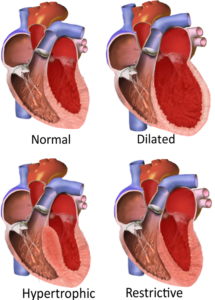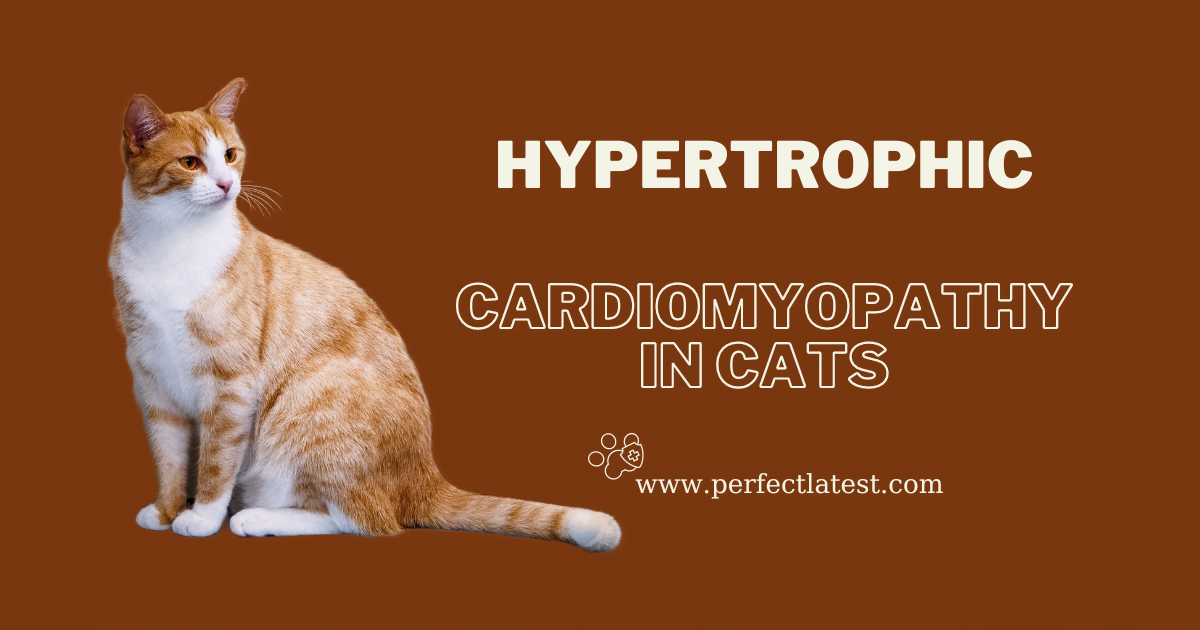Cats are experts at capturing our hearts while taking care of their health. Understanding their heart condition is crucial for every cat owner.
Heart diseases in cats can be hard to spot but greatly affect their well-being. This article will talk about What is hypertrophic cardiomyopathy in cats, signs to watch for, how vets diagnose them, available treatments, and steps to keep your cat’s heart healthy.

What is hypertrophic cardiomyopathy in cats:-
Heart disease in cats, also called cardiomyopathy, affects how the heart contracts, making it harder for blood to circulate.
A cat’s heart has four parts: two atria and two ventricles. Blood comes into the atria from the body and lungs, and then goes to the ventricles. It’s pumped to the lungs for oxygen or to the body through the aorta. When the heart has to work more, it gets thicker and bigger, losing some flexibility. This makes it harder for the ventricles to fill with blood, leading to a backup into the heart and lungs, causing heart failure.
Types of Heart Disease in Cats:-
There are three main types of heart disease in cats, and knowing about them is crucial for keeping your cat healthy:
- Hypertrophic Cardiomyopathy (HCM): This is the most common type. It involves thickening of the heart muscle, especially in the left ventricle walls, which can block blood flow.
- Dilated Cardiomyopathy (DCM): In DCM, the heart chambers, particularly the left ventricle, become enlarged, weakening the heart’s pumping ability.
- Restrictive Cardiomyopathy (RCM): RCM is characterized by scar tissue buildup on the heart’s inner lining, reducing its efficiency in pumping blood.
Understanding these types helps in early detection and proper management of your cat’s heart health.

What is hypertrophic cardiomyopathy symptoms:-
Knowing the signs of heart disease in cats is important for early action. Cats are good at hiding discomfort, but these symptoms might suggest a heart problem:
- Breathing Trouble: Rapid or difficult breathing, called dyspnea, could mean heart issues. Contact your vet if your cat pants or struggles to breathe.
- Lack of Energy: A sudden lack of energy could indicate heart disease. If your active cat becomes lazy, investigate further.
- Weight Loss: If your cat loses weight without explanation, it might be a sign of heart problems.
- Loss of Appetite: Cats with heart issues might lose interest in food, leading to more weight loss.
- Restlessness: Restlessness, especially at night, could mean your cat is uncomfortable due to heart disease.
- Fainting: In severe cases, your cat might faint due to poor blood flow. This is an emergency.
- Swollen Belly: Fluid buildup in the abdomen could cause a swollen belly.
- Blue Gums: In advanced cases, your cat’s gums might appear bluish due to lack of oxygen.
- Behavior Changes: Cats in pain might show changes like aggression or withdrawal. Watch for unusual behavior.
If you notice any of these signs, consult your vet for guidance.
Diagnose Hypertrophic Cardiomyopathy:-
Diagnosing heart disease in cats involves several steps:
- Physical Examination: The vet listens to the heart and lungs and checks for signs like a swollen abdomen or limbs.
- X-rays: These show the heart’s size and shape, revealing any abnormalities.
- Echocardiogram: It’s like a detailed ultrasound of the heart, helping diagnose specific conditions.
- Electrocardiogram (ECG): This records the heart’s electrical activity to spot irregularities.
- Blood and Urine Samples: These help check overall health and rule out other issues.
- Blood Pressure Measurement: It helps detect hypertension, often linked to heart disease in cats.

